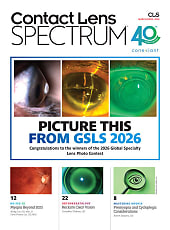A new study suggests that profilometry-guided scleral lenses may offer significant improvements in vision for patients who have irregular corneas.
Researchers in Italy reviewed medical records from 23 patients who had keratoconus, pellucid marginal degeneration, or post-LASIK ectasia who were fitted with customized lenses designed using corneoscleral profilometry. The retrospective case series, published in Eye & Contact Lens: Science & Clinical Practice, examined visual acuity and ocular aberrations before and during lens wear.
High-contrast visual acuity improved from an average of 0.62 logMAR at baseline to 0.03 logMAR with the lenses. Low-contrast vision also improved across multiple levels of testing. Measures of higher-order aberrations, including coma and trefoil, were significantly reduced. No adverse events were reported during the follow-up period.
The authors noted that while scleral lenses have long been used for visual rehabilitation in patients with corneal irregularities, this study provides evidence on the immediate benefits of lenses customized through profilometry. They emphasized that the small sample size and short follow-up period limit generalizability and that further research is needed to compare outcomes with conventional scleral lenses.
The findings suggest that profilometry-guided designs could provide an effective nonsurgical option for restoring vision in complex corneal conditions.
Barone V, Petrini D, Surico PL, et al. Profilometry-Guided Scleral Lenses Improve Visual Acuity and Reduce Ocular Aberrations in Irregular Corneas: A Retrospective Case Series. Eye Contact Lens. 2025 Jun 11. [Online ahead of print] doi: 10.1097/ICL.0000000000001199



